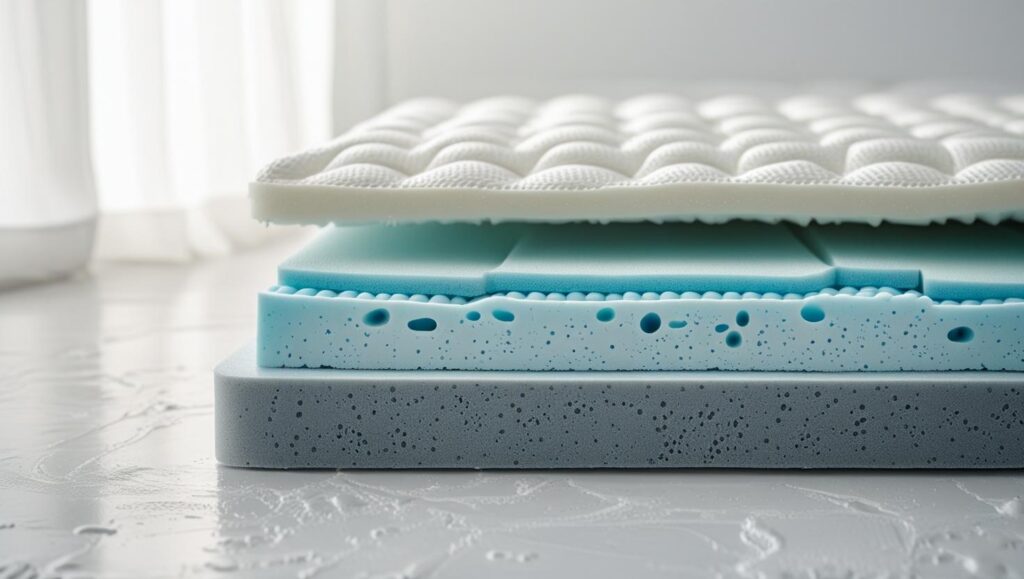Memory Foam Mattress vs Spring: 7 Proven Differences for Back Pain Relief
Updated 2025.
Meta Description
Compare memory foam mattress vs spring for back pain relief. Discover 7 proven differences, cooling, durability, and best fit for your sleep style.
Quick answer: A medium-firm memory foam mattress vs spring hybrid (foam over pocket coils) is often the sweet spot for back pain. Memory foam excels at pressure relief and motion isolation, while quality pocket coils add airflow, edge support, and gentle bounce. Match firmness to your body weight and sleep position, and always test a 90–120-night trial.
Featured: A quick visual on how foam and coils feel different under your spine.
Key Takeaways on Memory Foam Mattress vs Spring
Skim these highlights, then dive deeper into which build best supports your back.
- Back pain relief: A memory foam mattress vs spring hybrid keeps your spine neutral with contouring + coil support.
- Motion isolation: Foam soaks up movement; pocket coils limit partner disturbance better than open coils.
- Cooling: Springs breathe better; gel-infused or open-cell foams help hot sleepers.
- Durability: Quality foams often last 7–10 years; basic spring units may soften around 5–8.
- Best fit: Side sleepers lean toward foam or hybrids; many stomach/back sleepers prefer firmer pocket-coil builds.
Understanding the Mattress Types
Start with feel and build: foam contours for relief, coils lift for support and airflow. For a full breakdown of all options, see our Types of Mattresses guide.
What Is a Memory Foam Mattress?
Viscoelastic foam responds to heat and weight, cradling curves to reduce pressure on shoulders, hips, and the lumbar region. It’s excellent for motion isolation and offers a cushioned, “hug-like” feel.
What Is a Spring Mattress?
Steel coils provide the support core. Two common types:
- Open coil (Bonnell/continuous): A connected unit that feels bouncy but transfers more motion.
- Pocket coil: Individually wrapped springs that flex independently for better contouring and less motion transfer.
Example: If you like a buoyant feel with easier movement, a pocket-coil model or foam-over-coil hybrid mattress balances comfort and support.

Inside look: comfort foams up top, supportive pocket coils beneath.
How Mattresses Impact Your Back
Your mattress should keep the spine neutral and reduce pressure points. Some evidence suggests medium-firm surfaces improve pain and alignment, and population data show sleep quality is a public-health priority (CDC FastStats).
Spine Alignment
Neutral alignment means your ears, shoulders, and hips stay in a straight line. Foam aids alignment by filling gaps; coils provide lift so you don’t sink too far.
Pressure Relief
Pressure at shoulders and hips can aggravate back pain. Memory foam spreads weight evenly; pocket coils help when topped with quality comfort layers. If you’re sensitive to chemicals or allergies, consider models with CertiPUR-US certified foams or GREENGUARD Gold certifications to ensure healthier materials.
Motion Isolation
If you share a bed, less motion = fewer wake-ups. Deep-density foams excel here, and pocket coils also limit transfer. Learn more in our guide to reducing motion transfer.

Proper alignment reduces morning stiffness and supports natural curves.
Memory Foam Mattress vs Spring: Feature Comparison
Foam emphasizes contouring and stillness; springs add breathability and bounce. Hybrids aim to blend both.
- Spine support: Foam contours closely; pocket coils support and resist sag.
- Pressure relief: Foam is typically high; springs vary by coil type and foam quality.
- Motion transfer: Foam is very low; pocket coils are low, open coils are higher.
- Cooling: Foam can retain heat; springs breathe better.
- Durability: Good foams ~7–10 years; basic springs ~5–8 years.
- Bounce & mobility: Springs are springy; foam is slower-responding.
- Weight: Foam beds are heavier; spring beds are often lighter.
- Price range: Foam is mid to high; springs range from budget to luxury.
Example: If you toss and turn, a pocket-coil hybrid with a pressure-relieving foam top keeps motion down while making position changes easier.
Who Should Choose Memory Foam vs Spring?
Match the build to your body and sleep style. Weight and position influence how firm you should go.
- Side sleepers: Foam or plush-topped hybrids cushion shoulders and hips.
- Back sleepers: Medium-firm foam or hybrids balance contour and lift.
- Stomach sleepers: Firmer pocket-coil builds help prevent midsection sag.
- Hot sleepers: Springs or gel/open-cell foams promote airflow.
- Couples: Memory foam or pocket coils minimize sleep disruptions.
Example: A 190-lb back sleeper might prefer a medium-firm hybrid; a 130-lb side sleeper may enjoy a plusher memory foam feel.
Budget and Longevity Considerations
Costs vary widely in the memory foam mattress vs spring debate. Foam models often start mid-range and can last 7–10 years; entry-level spring beds may tire sooner (5–8 years). For healthier materials, look for CertiPUR-US certified foams or GREENGUARD Gold certified designs.
Example: If you want bounce without sacrificing relief, a foam-over-coil hybrid from our hybrid benefits guide offers durability, airflow, and contour in one build.
FAQ
Is memory foam better for back pain than spring?
Often, yes—foam’s contouring eases pressure. But a quality pocket-coil mattress with good comfort layers can support spinal alignment just as well. Some studies and reviews suggest medium-firm surfaces help with pain and alignment (Sleep Health Journal).
Do memory foam mattresses sleep hot?
Traditional foams can trap heat. Look for gel-infused or open-cell foams, or choose a hybrid for stronger airflow through the coil core.
How long do memory foam vs spring mattresses last?
Foam typically lasts about 7–10 years. Springs vary, but basic units average 5–8 years; premium pocket-coil builds with dense foams last longer.
Which mattress type is better for couples?
Memory foam absorbs motion best. Pocket coils are a close second and outperform open coils for partners with different schedules.
Should I choose a hybrid mattress instead?
Hybrids combine foam comfort with coil support and airflow—great if you want contour without feeling “stuck.” Explore our mattress types guide to compare builds.
Conclusion
When weighing a memory foam mattress vs spring, think alignment first. Foam wins for pressure relief and motion isolation; springs win for cooling and bounce. Many sleepers find a medium-firm hybrid delivers the best of both. Test a long trial, reassess your alignment, and fine-tune firmness to your body. For next steps, browse Cozy Bed Quarters’ mattress guides and sleep easier knowing you chose well.























